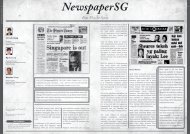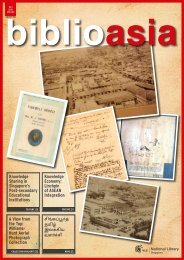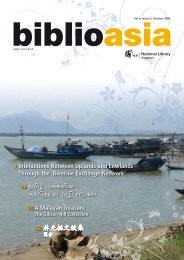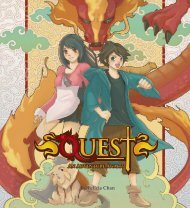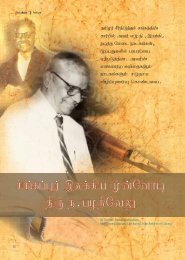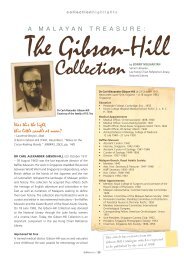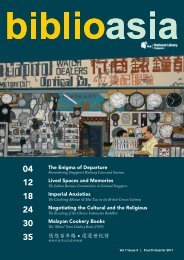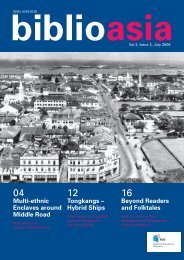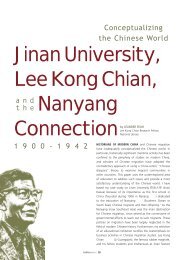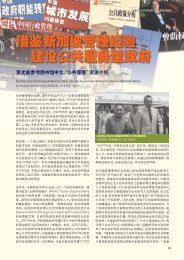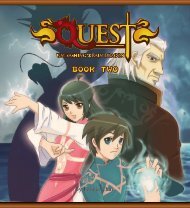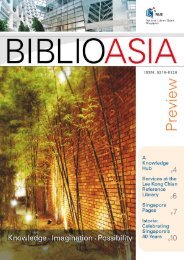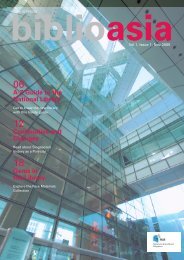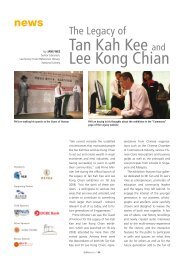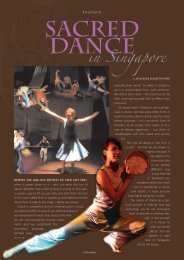éå°å¹³ä¸ æ°å å¡ç»éª - National Library Singapore
éå°å¹³ä¸ æ°å å¡ç»éª - National Library Singapore
éå°å¹³ä¸ æ°å å¡ç»éª - National Library Singapore
Create successful ePaper yourself
Turn your PDF publications into a flip-book with our unique Google optimized e-Paper software.
with details that a child growing<br />
up into a teenager would note.<br />
On the one hand, her account<br />
is of a childhood much like any<br />
other. She writes, for instance,<br />
of her struggle to establish a<br />
place for herself as the youngest<br />
member of a large family, and<br />
how she found solace in reading<br />
and music. On the other hand, it<br />
is a fascinating account of a child<br />
living in unusual times. The details<br />
of history are woven into the<br />
fabric of the story, and revealed<br />
Aishabee at War by Aisha Akbar<br />
All rights reserved, Landmark through the story, rather than<br />
Books, 1990<br />
through authorial intrusion.<br />
Aisha Akbar shows an awareness of her intended child<br />
audience, stating in her preface that her autobiography “is a true<br />
account, as far as I can remember, of the events before the war,<br />
and up till 1945, as seen through the eyes of a child.”<br />
She writes about the war in a factual, unsentimental way,<br />
sometimes finding humour even in dark situations. She recalls the<br />
somewhat surrealistic response of her neighbours to the bombing<br />
of <strong>Singapore</strong>:<br />
“I hung about the fringe of the crowd, trying to determine<br />
what was going on, but I soon realised that they knew no<br />
more than I did. . . . The word I heard most often was ‘war’,<br />
and it seemed strange to me that if they really did believe<br />
we were at ‘war’ no one had thought of turning off the<br />
lights. The whole of <strong>Singapore</strong> was lit as for a carnival, and<br />
the atmosphere was electric with excitement.” (p.74)<br />
A Young Girl’s Wartime Diary contains the diary entries of<br />
the writer from 1942 to 1945. However, as the writer chooses<br />
to arrange her entries thematically rather than chronologically,<br />
her account lacks narrative strength, and the reader has to piece<br />
together the overall picture of the events unfolding in the book.<br />
There is also a rather jarring shift in perspective from the adult<br />
authorial introduction to each section and the subsequent diary<br />
entries of the young author. Nevertheless, the book gives a<br />
genuine glimpse into the thoughts and feelings of a girl living in<br />
<strong>Singapore</strong> during the war.<br />
Edward Phua’s Sunny Days of an Urchin has a stronger<br />
narrative. Although the style of writing is not as elegant as in<br />
Aishabee at War, the book is peppered with interesting details<br />
of the author’s childhood. His account testifies to the sheer<br />
ingenuity shown by his family members in creating ways to cope<br />
with the shortages of food and basic necessities during the war.<br />
This included devising ways to grow padi in their backyard and to<br />
harvest the rice.<br />
Similarly, Peter Wee’s From Farm & Kampong testifies to the<br />
resilience shown by the local population in coping with the sudden<br />
changes to their lifestyles. Peter Wee speaks appreciatively of his<br />
father’s readiness to buckle down to farm work:<br />
“Work was hard and harsh, rest was a luxury, but Dad<br />
accepted his spartan life with calm fortitude. Any other<br />
man from Katong would perhaps have found it impossible<br />
to sustain such a life for any length of time, but the<br />
necessity of feeding six mouths maintained Dad’s resolve.<br />
He did not give up.” (p. 21)<br />
For the whole family, life soon changed from the “cultured,<br />
middle-class and English-educated urban ways” to the “harsh<br />
exigencies of farm life” (p. 23). However, Peter Wee also notes<br />
that their farm life did have its own rewards: he and his brothers<br />
soon became much more acquainted with nature (p. 25).<br />
Peter Wee has thoughtfully included black-and-white<br />
drawings of the two villages he lived in which are especially<br />
helpful as one of the villages no longer exists, while the other<br />
has changed substantially.<br />
From Farm & Kampong by Dr<br />
Peter H.L. Wee<br />
All rights reserved, Graham<br />
Brash, 1989<br />
Papa As A Little Boy Named<br />
Ah Koon by Andrew Tan<br />
All rights reserved, Ring of<br />
Light Publishers, 2007<br />
Similarly, Papa As A Little Boy Named Ah Khoon includes blackand-white<br />
illustrations which help the reader of today to bridge<br />
the gap between the <strong>Singapore</strong> of the 1940s and 1950s and the<br />
<strong>Singapore</strong> of today. As in Peter Wee’s book, the war occupies the<br />
first part of Andrew Tan’s book, which is a record of the author’s<br />
childhood from 1943 to 1953.<br />
A Young Girl’s Wartime Diary by<br />
Si Hoe Sing Leng<br />
All rights reserved, Lingzi Media, 2007<br />
Sunny Days of an Urchin by<br />
Edward Phua<br />
All rights reserved, Federal<br />
Publications, 1996<br />
The Lack of Fiction<br />
While there are a handful of noteworthy autobiographies for<br />
children set during the war, there does not seem to be any book of<br />
fiction. The closest example would be the fictionalised biography,<br />
Son of an Immigrant (2007) by Joan Yap, which is based on the<br />
real life story of a barrister, Mr Lui Boon Poh. However, the part<br />
set during the war takes place in Batu Pahat, in then Malaya. The<br />
story shifts to <strong>Singapore</strong> only when the narrator, Ah Di, leaves<br />
Batu Pahat to find work in <strong>Singapore</strong>. It is an inspiring story<br />
about having the courage to pursue one’s dreams, with the war<br />
setting only occupying six of its 28 chapters.<br />
While the book would have benefited from better editing, as<br />
12



